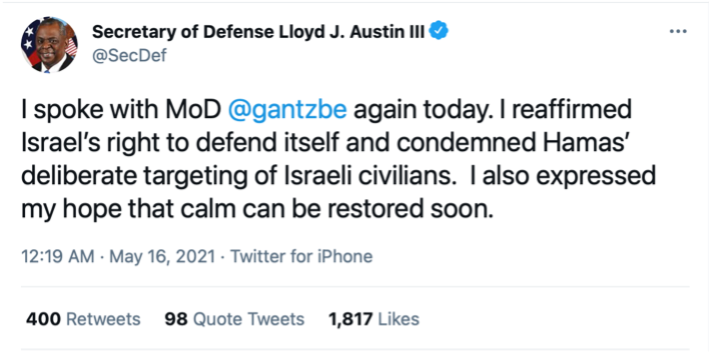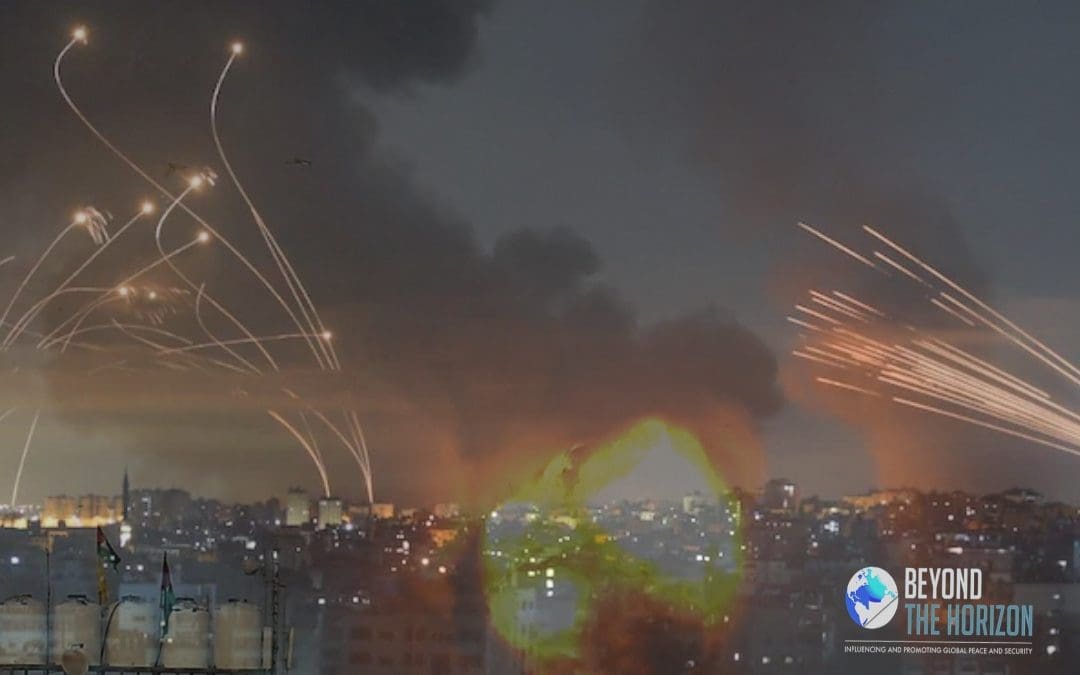Background
- In the week between May 1 and May 7, Palestinians started protesting against an incoming Israeli Supreme Court decision, expected to evict six Palestinian refugee families residing in Sheikh Jarrah neighbourhood in East Jerusalem. The move framed by Israeli officials as a petty real estate dispute is regarded by Palestinians as part of systematic Israeli efforts to remove thousands of Palestinians from East Jerusalem.
- On May 9, the Israeli Supreme Court delayed decision on expulsion of Palestinian settlers after the immense attention the issue received. This was part of measures to defuse tensions.
- On May 10, violence intensified after Israeli security forces raided al-Aqsa mosque while many worshippers prayed, firing stun grenades, tear gas and rubber-coated metal rounds. Three hundred Palestinians were injured in clashes with Israeli police while the latter reported 21 officers were hurt in the skirmishes. The upsurge in violence came as Israel celebrated “Jerusalem Day”, marking its capture of East Jerusalem in the 1967 Arab-Israeli war.
- On May 10, Hamas spokesperson Abu Obeida demanded Israel to withdraw its forces from the Al-Aqsa mosque and release all detained Palestinians until 6 pm or 3 pm GMT. After the first rocket landed in the western part of Jerusalem in the face of missed deadline, he further threatened with more attacks if Israel sent more security forces into the mosque and continued with eviction of families from Sheikh Jarrah.
- Since May 11, militants in Gaza fire rockets targeting Israeli cities, mainly Tel Aviv and Ashkelon, while the Israeli Air Force conduct air operations on targets in Gaza.
- As of May 17, Hamas has fired more than 3200 rockets into Israel, whereas Israel Air Force has conducted hundreds of airstrikes. As of May 16, the total number of Palestinians killed in Israeli airstrikes amounted to at least 197. The number of Israeli residents killed rose to 11 in the same timeframe.
Analysis
a. Political Background
Eastern Jerusalem and the latest escalation of violence between the current Israeli government and Hamas has moved from fringes to the epicenter of international attention. The escalation comes at a critical juncture in time.
As regards Israel, the political alliance formed by a wide spectrum of parties running the gamut from left- to right-wing had been trying to unseat Prime Minister Benjamin Netanyahu in the last two years in four inconclusive elections. At a time when the alliance was so close to end 12-year Netenyahu hegemony in Israeli politics, this final escalation extended the lifeline the premier needed to stay in power. Naftali Bennett, head of pro-settler Yamina party and a key figure in the effort to oust Netanyahu to become prime minister of the alliance, was the first figure to restart negotiations with Netanyahu’s Likud Party. With this latest escalation, Netanyahu has been able to weather the political challenge he faced.
From the Palestinian side, the escalation came after the postponement of the Palestinian elections scheduled for May 22, first time after 15 years. Abbas had given achieving national unity and ending the division between the West Bank and Gaza as a motive for his decision to hold elections for the first time since 2006. He blamed Israel for his decision of postponement, saying it failed to confirm it will allow voting in East Jerusalem. The postponement decision by Mahmoud Abbas came after divisions appeared within the Fatah Party and signs were visible that Hamas would do well in the elections. Accordingly, Nasser al-Qudwa, a nephew of late Arafat, submitted a rival list that received the blessing of Marwan Barghouti, a popular Fatah leader jailed by Israel in 2004. Mohammad Dahlan, a former controversial Fatah leader runs his own list too. Hamas also changed the composition of its list, diverging from its initial agreement with Fatah.
A poll on probable results of Palestinian elections conducted by Jerusalem Media and Communication Center (JMCC)in partnership with Friedrich Ebert Foundation showed main Fatah list ranked first with 25% of the votes, followed by Al-Qudwa’s ‘Freedom’ list as second with 13%, Dahlan’s ‘Future’ third with 9% and Hamas fourth with 8.2%. Yet, the postponement decision shows Abbas cannot be sure that election results would renew his legitimacy.
When taken together with the fact that 68 percent of the Palestinians wants Abbas to resign, the latest Hamas activism hints at an intention to build upon the frustration of the Palestinians over the way Abbas managed the election process, how he managed Palestinian Authority and Fatah. Hamas wants to increase its support base in the West Bank also by showing it responds to the frustrations of Palestinians in East Jerusalem. It should be noted that Palestinians closely follow political processes and according to the Palestinian Central Elections Commission, approximately 93% of the 2.8 million eligible voters had registered to cast a ballot.
b. Status of East Jerusalem
The forceful eviction of refugee families residing in Sheikh Jarrah neighborhood in East Jerusalem is cited as one of the main reasons for the latest escalation. This brings into mind the question of if this move is legal according to international norms and what the legal status of East Jerusalem is.
Starting from the latter, the Advisory Opinion of the International Court of Justice on the legal status of East Jerusalem states that East Jerusalem is occupied territory and Israel is the occupying power. The law of occupation rests upon the main principle that the occupying power “cannot lead to or cause any transfer or change of sovereignty.” Its role puts Israeli state into responsibility of ensuring public order and safety while respecting the laws in the country. Israel cannot extend its own legislation over the occupied territory, let alone acting as a sovereign legislator.
Article 46 of the Hague Relations, the norm regulating property rights in occupied territory, mandates that private property “cannot be confiscated” or permanently taken with transfer title to it. Echoing this norm, spokesperson for the UN High Commissioner for Human Rights, Rupert Colville, says East Jerusalem is part of occupied Palestinian territory where occupying power cannot confiscate private property.
In defiance of the international norms, Israel has applied Israeli domestic legislation in East Jerusalem, settled Jews here and thus tried to change demographics. In this regard, Israel has used land expropriations, absentee property legislation, the Legal and Administrative Matters Law of 1970, and planning and building activities as tools to attain those objectives. Colville denounces these practices stating: “The transfer of parts of an occupying Power’s civilian population into the territory that it occupies is prohibited under international humanitarian law and may amount to a war crime.”
To have a better understanding on the size of the problem, according to OCHA, at least 218 Palestinian households in East Jerusalem have eviction cases filed against them. The majority of the cases have been initiated by ‘settler organizations’, placing 970 people, including 424 children, at risk of displacement.
In tandem with de facto annexation of East Jerusalem and demographic expansion within it, Israel has also adopted a policy of “revocation of residency” which translates into forceful displacement of Palestinians. This practice, which is in total defiance of international law, has resulted in the revocation of residency status of 4577 Palestinians (including 99 children) of East Jerusalem by the Israeli Ministry of Interior in 2008 alone.
c. International Support
So far, the major powers have highlighted the need for de-escalation of the tension and have tried to use a calibrated language towards Israel. The US President Joe Biden said on last Wednesday: “My expectation and hope is this will be closing down sooner than later. Israel has a right to defend itself when you have thousands of rockets flying into your territory.” His statements were supported with those of the Secretary of State Tony Blinken and the Secretary of Defense Lloyd J. Austin III. The former’s call with Palestinian Authority read: “The Secretary condemned the rocket attacks and emphasized the need to de-escalate tensions and bring the current violence to an end.” 
Ursula von der Leyen, President of the EU Commission, sounded her concerns in a similar fashion when she tweeted: “Very concerned by the situation in Israel and Gaza. I condemn indiscriminate attacks by Hamas on Israel. Civilians on all sides must be protected. Violence must end now.
British Prime Minister Boris Johnson said: “The UK is deeply concerned by the growing violence and civilian casualties, and we want to see an urgent de-escalation of tensions.” German Foreign Minister Heiko Maas said, “The rocket attack on Israel is absolutely unacceptable and must end immediately. Israel has in this situation the right to self-defence. This escalation of violence can be neither tolerated nor accepted.”
d. Where We Are Now
Early on Sunday (May 16), at least 42 Palestinians were killed in airstrikes on several apartment buildings in Gaza City. The total number of killed in Israeli airstrikes amounted to at least 197 since the fight broke out. The number of Israeli residents killed rose to 11 in the same timeframe.
On Sunday, the UN Security Council met online with no tangible decision taken. The Security Council will meet on May 18 again to discuss the same issue. On the same day, Prime Minister Netanyahu said Israel’s operations would continue “with full force”.
Strategic Foresight
The latest escalation comes after Israeli political elites and Hamas leadership are in a crisis of legitimacy, both in desperate need of political manoeuvre to prop up support. The Israeli security forces raid on Aqsa Mosque in the holiest Muslim month Ramadan was a guaranteed recipe for escalation. The postponement of the elections by Mahmoud Abbas and divisions within Fatah on the other end opened up space for Hamas to claim to be an able group genuinely responding to the frustrations of the Palestinians in East Jerusalem. So far, with the escalation, Hamas has fired more than 3200 rockets into Israel, whereas Israel Air Force has conducted hundreds of airstrikes. With the escalation, Netanyahu has been able to disintegrate the opposition block by creating a rally around effect, shaking off his political crisis.
With :
- the UN Security Council de facto paralyzed by vetoes,
- major international actors not critical if not supportive of Israeli airstrikes,
- Israel following a tradition of exacting a heavy toll on its security challenges,
it is likely that Israel will continue to its airstrikes over Gaza at least until Hamas stops targeting it with rockets.
When will the weapons be silenced? This will depend on the readiness of both sides for a ceasefire. But it is probable that Israel will continue its strikes in the coming month as part of its efforts to exact a heavy toll on Hamas and Gaza for the attacks, and keep the Israeli public distracted from the political agenda eclipsed by this development. This also eclipses the crisis in East Jerusalem as regards forceful evictions and protests.
Hamas has intrinsic reasons to continue attacks into Israeli territory in order to increase support base and make a show of force. Although the loser is clearly the Palestinians and Gaza in this initiative, Hamas will more likely be interested in the political gains.
Currently, Israeli combat troops have been positioned along the Gaza border, and an Israeli military spokesman said they were in “various stages of preparing ground operations.” The escalation has the potential to spiral into a wider conflict as in the Israel-Gaza wars in 2014 and 2008-2009.
By especially using fora like UN and NATO, the international society should dictate a ceasefire and de-escalation on both sides to preclude further loss of innocent life.
* Onur Sultan is Director of Terrorism, Conflict & War at Beyond the Horizon ISSG.

